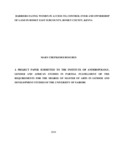| dc.description.abstract | This study looked at the barriers that face women in access to, control over and ownership of
land in Bomet East Sub-County. The study had three objectives: To analyse the awareness levels
of women on their legal land rights, to determine the socio-cultural barriers that hinder women
from exercising those rights, and to describe the political and administrative barriers facing them.
The findings indicate that Kipsigis customary law allows women to access land through
marriage. However, in practice married women in monogamous and polygynous unions only
own land by proxy, that is, by virtue of being married to their husbands whose names are used in
land registration. Widows only serve as custodians, who hold land until their sons become of
age. The study findings also indicate that the majority of the women in the Sub-County are not
fully informed of their land rights. There is a strong correlation between literacy levels,
economic status, marital status and women land ownership. Educated women are more
knowledgeable about legal land rights as compared to illiterate women. Economically
empowered women are more likely to purchase land of their own. Married women can hardly
make a sole decision of acquiring or disposing land. While women‟s rights to land are protected
under the Kenyan Constitution of 2010 and in various national statutes, in practice, women
remain disadvantaged and discriminated. The main source of restriction is customary laws and
practices, illiteracy and low economic status which continue to prohibit women from owning or
inheriting land. In order to increase the levels of awareness of women land rights, there is need
for thorough trainings and consciousness-raising campaigns in women land rights. Women need
to be given free litigation services to enable them pursue court proceedings in case of land
grabbing. In addition, there is need for men involvement in women land rights discussions to
help in shunning patriarchal tendencies that continue to be a great hindrance to women land
ownership. Finally, donor agencies should consider funding organizations like Kenya Land
Alliance which runs programmes that promote women land rights through sensitization and
trainings. | en_US |



